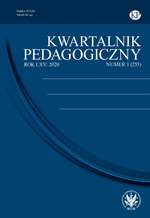W trosce o polskość dzieci i młodzieży z okresu drugiej wojny światowej w Nowej Zelandii
In an effort to preserve the polish identity of children and youth during the second world war in New Zealand
Author(s): Witold ChmielewskiSubject(s): Social Sciences, Education, Psychology, Sociology
Published by: Wydawnictwa Uniwersytetu Warszawskiego
Keywords: Exiles; settlement; children; retaining the Polish identity; depriving of the national identity; upbringing
Summary/Abstract: The aim of the article is to present the issue of retaining the national identity among the youngest Polish exiles living in New Zealand. To present that issue, methods appropriate for the history of education were applied. The basis of the research were the materials stored in the Polish Institute and Sikorski Museum in London. As a result of the archival research, at the invitation of the Prime Minister Peter Fraser, a group of Polish children arrived in the settlement of Pahiatua in New Zealand. They were mainly orphans with their carers. The exiles were provided with good living conditions. School children were prepared to return to free Poland after the war, they attended Polish schools in the settlement and the older ones attended New Zealand schools run mainly by the Catholic Church. The moment Poland found itself under the Soviet influence and the power was taken by the communists, the exiles from Pahiatua did not want to return to the enslaved country. They decided to stay in the friendly New Zealand. In that situation, the issue of retaining their national identity arose, along with the need to provide them with education, profession and work. The concept of resisting the policy of depriving the young generation of their national identity was in the focus of the Polish authority in London. It was also a matter of great concern of the teachers and carers in the settlement of Pahaiatua. Many initiatives were taken which aimed at retaining the Polish identity among children and youth living in New Zealand, who gradually started work in the unknown environment. The conducted activities to retain the Polish identity bore positive results. The Polish identity wasretained not only by the exiles but also by their children and grandchildren, who, not knowing the language of their ancestors, cultivate national traditions and remember their roots. As a result of the presented deliberations, we may draw a conclusion that the conduct of the Polish authority in exile in the analysed issue was appropriate. In such a situation one should act similarly and always consistently.
Journal: Kwartalnik Pedagogiczny
- Issue Year: 254/2019
- Issue No: 4
- Page Range: 272-290
- Page Count: 19
- Language: Polish
- Content File-PDF

